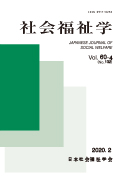Volume 60, Issue 4
Displaying 1-16 of 16 articles from this issue
- |<
- <
- 1
- >
- >|
Original Articles
-
2020Volume 60Issue 4 Pages 1-13
Published: February 29, 2020
Released on J-STAGE: May 23, 2020
Download PDF (541K) -
2020Volume 60Issue 4 Pages 14-27
Published: February 29, 2020
Released on J-STAGE: May 23, 2020
Download PDF (441K) -
2020Volume 60Issue 4 Pages 28-41
Published: February 29, 2020
Released on J-STAGE: May 23, 2020
Download PDF (466K) -
2020Volume 60Issue 4 Pages 42-55
Published: February 29, 2020
Released on J-STAGE: May 23, 2020
Download PDF (467K) -
2020Volume 60Issue 4 Pages 56-67
Published: February 29, 2020
Released on J-STAGE: May 23, 2020
Download PDF (487K) -
2020Volume 60Issue 4 Pages 68-81
Published: February 29, 2020
Released on J-STAGE: May 23, 2020
Download PDF (802K)
Spring Symposium
-
2020Volume 60Issue 4 Pages 82-85
Published: February 29, 2020
Released on J-STAGE: May 23, 2020
Download PDF (285K) -
2020Volume 60Issue 4 Pages 86-89
Published: February 29, 2020
Released on J-STAGE: May 23, 2020
Download PDF (332K) -
2020Volume 60Issue 4 Pages 90-91
Published: February 29, 2020
Released on J-STAGE: May 23, 2020
Download PDF (204K) -
2020Volume 60Issue 4 Pages 92-95
Published: February 29, 2020
Released on J-STAGE: May 23, 2020
Download PDF (310K) -
2020Volume 60Issue 4 Pages 96-99
Published: February 29, 2020
Released on J-STAGE: May 23, 2020
Download PDF (329K)
Book Review
-
2020Volume 60Issue 4 Pages 100-102
Published: February 29, 2020
Released on J-STAGE: May 23, 2020
Download PDF (206K) -
2020Volume 60Issue 4 Pages 103-105
Published: February 29, 2020
Released on J-STAGE: May 23, 2020
Download PDF (220K) -
2020Volume 60Issue 4 Pages 106-109
Published: February 29, 2020
Released on J-STAGE: May 23, 2020
Download PDF (240K) -
2020Volume 60Issue 4 Pages 110-112
Published: February 29, 2020
Released on J-STAGE: May 23, 2020
Download PDF (219K)
Book Introduction
-
2020Volume 60Issue 4 Pages 113
Published: February 29, 2020
Released on J-STAGE: May 23, 2020
Download PDF (136K)
- |<
- <
- 1
- >
- >|
